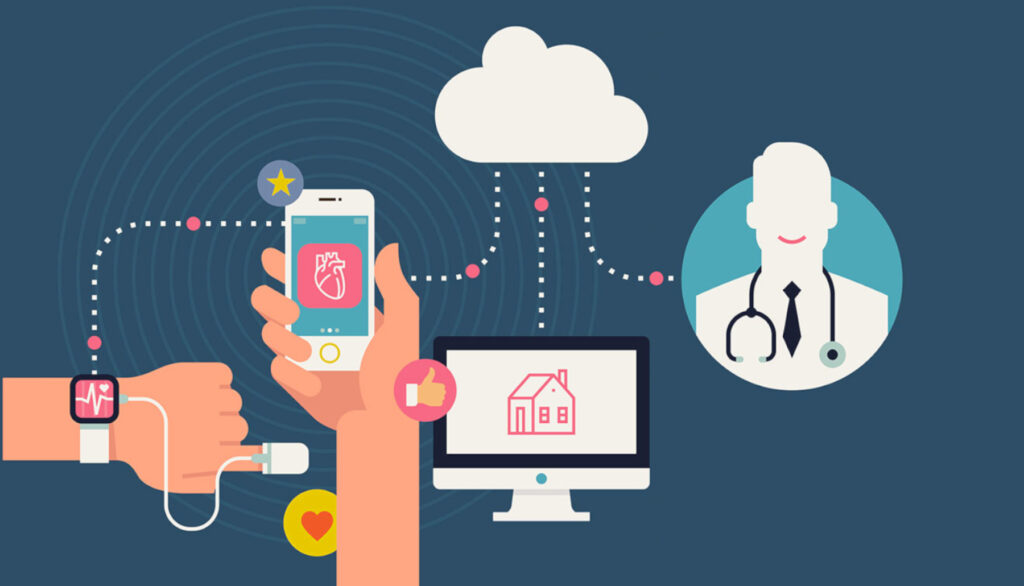The Internet of Things (IoT) is transforming healthcare by enabling smart medical devices that enhance patient monitoring, diagnostics, and treatment. Connected sensors, wearable devices, and AI-driven analytics are driving a shift towards personalized, data-driven healthcare. IoT empowers real-time health tracking, remote patient management, and predictive analytics, ultimately improving patient outcomes while reducing healthcare costs.
Key Applications of IoT in Smart Healthcare Devices
1. Remote Patient Monitoring and Chronic Disease Management
- IoT-enabled wearable devices such as smartwatches, fitness bands, and biosensors continuously track vital signs like heart rate, blood pressure, glucose levels, and oxygen saturation.
- Patients with chronic conditions such as diabetes, hypertension, and cardiac disorders benefit from real-time data transmission to healthcare providers.
- AI-driven analytics help detect anomalies and trigger automated alerts for immediate medical intervention.
- Example: The Dexcom G6 glucose monitor wirelessly transmits real-time blood sugar readings to smartphones, allowing diabetics to manage their condition effectively.
2. Smart Wearables for Early Disease Detection
- Advanced IoT wearables use AI-powered analytics to detect early signs of diseases before symptoms appear.
- Smart rings, patches, and implantable sensors monitor biometric patterns and provide predictive health insights.
- Example: The Apple Watch and Fitbit Sense detect irregular heart rhythms and atrial fibrillation, alerting users to seek medical attention before complications arise.
3. IoT in Telemedicine and Virtual Healthcare
- IoT-enabled devices bridge the gap between patients and doctors by facilitating real-time consultations through telehealth platforms.
- Connected medical equipment, such as digital stethoscopes, ECG monitors, and otoscopes, allow doctors to conduct remote diagnostics.
- Smart medication dispensers ensure patients adhere to prescription schedules by sending reminders and alerts.
- Example: TytoCare’s remote examination kits allow patients to perform self-exams guided by AI while doctors diagnose conditions remotely.
4. AI-Driven Smart Hospitals
- IoT integration in hospitals enhances operational efficiency by automating patient monitoring and medical asset tracking.
- Smart hospital beds adjust patient positions to prevent bedsores, improving comfort and recovery.
- RFID-enabled smart tags track medical equipment, reducing loss and optimizing hospital resource utilization.
- Example: Mount Sinai Hospital in New York leverages IoT to monitor hospital bed occupancy and streamline patient admissions.
5. IoT for Elderly and Assisted Living Care
- Smart home healthcare solutions support elderly and disabled individuals by offering fall detection, emergency alerts, and medication reminders.
- AI-powered voice assistants integrated with IoT devices enable seniors to manage their health through voice commands.
- Example: CarePredict Tempo uses AI and motion sensors to detect changes in a senior’s daily routine, alerting caregivers to potential health issues.
6. Smart Prosthetics and Rehabilitation Devices
- IoT-driven prosthetics and exoskeletons provide real-time feedback, allowing users to control movements with precision.
- AI-powered bionic limbs learn from user behaviors and adjust accordingly for improved mobility.
- Example: Ottobock’s C-Leg is an IoT-enabled prosthetic that adapts in real time to walking conditions, enhancing mobility for amputees.
7. Predictive Maintenance for Medical Equipment
- IoT sensors continuously monitor MRI machines, ventilators, and dialysis units to detect signs of malfunction before failures occur.
- AI-powered predictive analytics help schedule proactive maintenance, reducing hospital downtime and equipment failures.
- Example: GE Healthcare’s Asset Performance Management system uses IoT to monitor the condition of medical imaging devices, preventing unexpected breakdowns.
Challenges and Ethical Considerations
1. Data Security and Privacy Risks
- IoT devices generate vast amounts of sensitive health data, making them prime targets for cyberattacks.
- Strong encryption, blockchain technology, and multi-factor authentication are necessary to safeguard patient information.
2. Interoperability Issues
- Different manufacturers use varied data formats and communication protocols, causing integration challenges between IoT devices and healthcare systems.
- The adoption of universal healthcare IoT standards is essential for seamless device connectivity.
3. Cost and Accessibility Concerns
- IoT-powered healthcare solutions require high investment in infrastructure, device maintenance, and data storage.
- Ensuring affordability and accessibility, particularly in rural and low-income regions, is crucial for equitable healthcare advancements.
- AI and 5G-enabled IoT will facilitate instantaneous data transmission, enabling ultra-fast telemedicine consultations and real-time remote surgeries.
- Nanotechnology-integrated IoT devices will enable microscopic health monitoring at a cellular level.
- The rise of digital twins—virtual replicas of patients powered by IoT—will revolutionize personalized treatment planning.
IoT is redefining modern healthcare by enabling proactive and personalized patient care. As technology evolves, IoT-driven smart medical devices will continue to enhance health outcomes, improve efficiency, and shape the future of digital healthcare systems.

